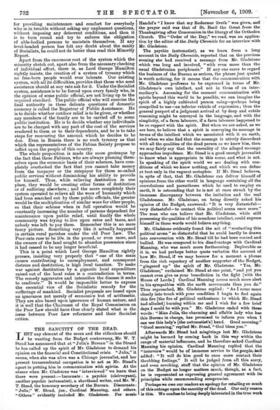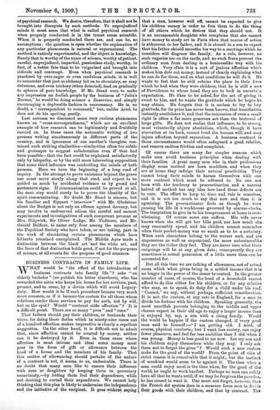THE SANCTITY OF THE DEAD.
T4ESTany element of the mean and the ridiculous should be wanting from the Budget controversy, Mr. W. T. Stead has announced that at "Julia's Bureau" in the Strand he has called up the spirit of Mr. Gladstone to demand his opinion on the financial and Constitutional crisis. "Julia," it seems, when she was alive was a Chicago journalist, and her present transcendental occupation is to act as Mr. Stead's agent in putting him in communication with spirits. At the séance when Mr. Gladstone was "interviewed" we learn that there were present :—Incarnate : a psychic (clairvoyant), another psychic (automatist), a shorthand writer, and Mr. W. T. Stead, the honorary secretary of the Bureau. Discarnate : "Julia," W. Stead, jun., Cardinal Manning, and others. " Othere " evidently included Mr. Gladstone. For music Handel's " I know that my Redeemer liveth " was given, and the prayer said was that of St. Basil the Great from the Thanksgiving after Communion in the liturgy of the Orthodox Church. The "Order of the Day," we read, was an applica- tion by the editor of the Daily Chronicle for an interview with Mr. Gladstone.
The psychic (automatist), as we learn from a long account in the Daily Chronicle, reported that on the previous evening she had received a message from Mr. Gladstone which was long and involved, "with even more than the usual Gladstonian periphrasis." If any one cares to regard the business of the Bureau as serious, the phrase just quoted is worth noticing, for it means that the communication with Mr. Gladstone professes to be expressed in terms of Mr. Gladstone's own intellect, and not in those of an inter- mediary's. Assuming for the moment communication with spirits beyond this world to be possible, we can imagine the spirit of a highly cultivated person using—perhaps being compelled to use—an inferior vehicle of expression ; thus the general purport of a judgment arrived at by deep and subtle reasoning might be conveyed in the language, and with the simplicity, of a farm labourer, if a farm labourer happened to be en rapport with the spirit. But when we are asked, as we are here, to believe that a spirit is conveying its message in terms of the intellect which we associated with it on earth, and when we also find that the message is utterly discordant with all the qualities of the dead person as we knew him, then we may fairly say that the unreality of the alleged message approaches impudence. Mr. Stead is a good enough journalist to know what is appropriate in this sense, and what is not. In speaking of the spirit world we are dealing with con- ditions of which we know nothing, and which we can define at best only in the vaguest metaphor. If Mr. Stead believes, in spite of that, that Mr. Gladstone can deliver himself of opinions from the other world in language containing all the convolutions and parentheses which he used to employ on earth, it is astounding that he is not at once struck by the immense discrepancy between the imitation and the real Gladstonese. Mr. Gladstone, on being directly asked his opinion of the Budget, answered : "It is very distasteful— very distasteful—to contact this political arena once more." The man who can believe that Mr. Gladstone, while still possessing the qualities of his mundane intellect, could express himself in those words would believe anything.
Mr. Gladstone evidently found the act of "contacting this political arena" so distasteful that he could hardly be drawn into conversation with Mr. Stead till he had been coaxed and bullied. He was compared to his disadvantage with Cardinal Manning, who was much more forthcoming. Deplorable as it is, we bad perhaps better quote verbatim the account of how Mr. Stead, if we may borrow for a moment a phrase from the rich repertory of another supporter of the Budget, "gingered up" the spirit of Mr. Gladstone. "Yes, Mr. Gladstone," exclaimed Mr. Stead at one point, "and yet you cannot even give us your benediction in the fight [with the House of Lords.] Cardinal Yenning seems much more alert in his sympathies with the earth movements than you do." Thus reproached, Mr. Gladstone replied : "As I come more closely into touch with your condition I begin to feel again this fire [the fire of political enthusiasm to which Mr. Stead had alluded] burning within me and I wish for a few brief days I could be with you." Mr. Gladstone ended with these words : "Miss Julia, the charming and affable lady who has this Bureau in charge, has promised to inform you when I can use this lady's [the automatist's] hand. Good morning." "Good morning," replied Mr. Stead, "God bless you."
Afterwards Mr. Stead had misgivings lest Mr. Gladstone might be harmed by coming back in this way within the range of material influences, and he therefore asked Cardinal Manning his opinion. Cardinal Manning replied that the " interview " would be of immense service to the-pal:marina added : "It will do him good to once more contact their throbbing feelings." It will be judged from ell this sorry', and even revolting, stuff that the opinion of Mr. Gladstone on the Budget no longer matters much, though, as a fact, he is represented as expressing general agreement with its principles while recommending compromise.
Perhaps we owe our readers an apology for retailing so much of this outrage upon the sanctity of the dead. Our only reason is this. We confess to *being deeply interested in the true work
of psychical research. We desire, therefore, that it shall not be brought into disrepute by such methods. To unprejudiced minds it must seem that what is called psychical research when properly conducted is in the truest sense scientific. When it is properly conducted there are, and can be, no assumptions ; the question is open whether the explanation of any particular phenomena is natural or supernaturaL The method is entirely experimental, and the object is knowledge. Surely that is worthy of the name of science, worthy of patient, careful, unprejudiced, impartial, passionless study, worthy, in fact, of a better fate than to be vulgarised and brought into ridicule and contempt. Even when psychical research is practised by over-eager or even credulous minds, it is well to remember that just as alchemy led on to chemistry, so may delusions, and even trickery (when detected), lead on gradually to spheres of pure knowledge. If Mr. Stead were to make any impression on foolish people by the business of "Julia's Bureau," he would be doing science a disservice, and simply encouraging a deplorable fashion in necromancy. He is, no doubt, a "correspondent to command," but, unlike Ariel, he does not do his spriting gently.
Last autumn we discussed some very curious phenomena known as "cross-correspondences," which are an excellent example of how research can be legitimately and fruitfully carried on. In these cases the automatic writing of two persons writing simultaneously in different parts of the country, and in ignorance of one another's thoughts, con- tained such striking similarities—similarities often to subtle and grotesque to suggest collaboration even if that had been possible—that the fact could be explained satisfactorily only by telepathy, or by the still more interesting supposition that some third influence was controlling the minds of both persons. Here we have the beginning of a long road of inquiry. In the attempt to prove existence beyond the grave one must move slowly along that road, and expect to be guided as much by accidental evidence as by grand and portentous signs. If communication could be proved at all, the next step would surely be to prove the identity of the spirit communicating. No doubt Mr. Stead is sincere, but his familiar and flippant " interview " with Mr. Gladstone about the Budget is not only an offence against decency, but may involve in undeserved odium the careful and earnest experiments and investigations of such competent persons as Mrs. Sidgwick, Sir Oliver Lodge, Mr. Podmore, and Mr. Gerald Balfour, to name only four among the members of the psychical Society who have taken, or are taking, part in the work of elucidating certain phenomena which have hitherto remained unexplained. The Middle Ages made a distinction between the black art 'and the white art, and the force of that distinction holds good, if not for the purposes of science, at all events for the purpose of good manners.































































 Previous page
Previous page